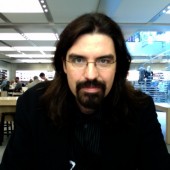Actions and Answers | Office Hours
 Happy New Year to all! It's that time of the year when we look forward and back. “Top Ten”–style lists appear in our feed readers, revisiting the highs and lows of 2014 and pointing us toward what 2015 will bring.
Happy New Year to all! It's that time of the year when we look forward and back. “Top Ten”–style lists appear in our feed readers, revisiting the highs and lows of 2014 and pointing us toward what 2015 will bring.
At the end of this past semester, Char Booth, director of research, teaching, & learning services at the Claremont Colleges Library (and a 2008 LJ Mover & Shaker), joined my Hyperlinked Library class for an online social hour. Our topic: reflective practice. (For more, see “Reflective Practice.”) Booth, author of Reflective Teaching, Effective Learning: Instructional Literacy for Library Educators (ALA Editions), shared the work of John Dewey to highlight the attitudes required for reflective action in teaching. Of course, the same can be applied to librarianship.
A call to action
The attitudes or reflective action, highlighted in an article by Grant and Zeichner (2001), includes open-mindedness, responsibility, and wholeheartedness. All are important and resonate deeply with me and my philosophy of what librarianship should be about. Approaching something with a sense of wholeheartedness means we are all in all the time, not just when it’s convenient. It means bucking the status quo to do the right thing at the right moment. It means owning our actions as professionals.
I am most excited about this evolution of who we are and what we do on the ground and in the trenches. The most important problems and challenges will be solved by the folks meeting them head-on everyday via reflective action. Some of the projects and innovations we’ve seen recently add to a promising vision for the future.
A timely and moving example: Missouri’s Ferguson Public Library staff rose to an incredible challenge and in my mind triumphed as they kept their doors open throughout the tumultuous times the city experienced last year. The library became, in the words of the media and LIS folks, a safe place, an oasis, a refuge, and an inspiration. The donations that poured in via a library website PayPal link, hovering over $350K as of this writing, are indicative of what’s possible even under the most dire circumstances.
Think of the challenges you’ve faced professionally. Budgets, personnel issues, technology, unruly users, and closed-minded governing bodies come to mind. How have you solved them? Or maybe it’s the homeless, a test of service that many public libraries face every day, in towns large and small. A high degree of mindfulness—being open to new ideas and new ways of doing things—may be just the right fit.
Don’t miss the recent LJ report highlighting Edmonton Public Library’s outreach program to support the city’s homeless population expanding to five additional branches in the coming months. Lisa Peet reported that in 2011, in response to the growing challenge of homeless people seeking shelter, “EPL became the first library in Canada to hire an outreach worker, Jared Tkachuk.” When grant funding ran out, the library opted to continue the program. Read the piece. It’s stirring.
A refreshing idea
The Salt Lake City Public Library (SLCPL) is exploring staying open 24 hours a day, seven days a week. This action seeks to make the library available to those who work during regular hours and can’t make use of services and space. What a refreshing and interesting idea, which many libraries should consider if funding, staffing, and policy allow. I’ve met academic librarians who rave about their 24-7 initiatives, but this is my first encounter with an “open all night” public library. Sure, there’s ongoing debate about who will be using the library at 3 a.m., but John Spears, SLCPL executive director, told the Salt Lake Tribune that all “the regulations that apply to the library during the day are also on at night. We won’t allow people to sleep or camp out.”
In another form of outreach that breaks down the barriers of the digital divide, I’m excited to read that the New York Public Library will be checking out Wi-Fi hot spots for free in a move to help the five boroughs provide access for all. Finally, I’m reminded of what the Los Angeles Public Library is doing with the high school diploma program, filling a need in its community. The Career Online High School reaches citizens of L.A. via an online program that surely makes a difference in the lives of those who complete it.
Answers ahead
What might we take away from these ideas? I’d argue it’s that the problems and challenges we face might be best answered through reflective action. These examples did not come about from hesitating, ignoring problems, or heaping on more restrictive policy but from meeting problems directly, not backing down, and moving ahead with our purpose firmly understood. I am hoping that we will see less professional self-questioning, less redefining of the profession, and more firm, outward-facing action performed with an open mind and heart.
RELATED
ALREADY A SUBSCRIBER? LOG IN
We are currently offering this content for free. Sign up now to activate your personal profile, where you can save articles for future viewing









Add Comment :-
Comment Policy:
Comment should not be empty !!!
Michael Dubensky
I remember taking an internet class taught by you at Dominican University. I was wondering if you could help me understand the definition of "permanent placement" in the 2014 Placements and Salaries Survey. Does that include part-time jobs and jobs in the corporate marketplace that are not Librarian jobs?Posted : Jan 09, 2015 03:50